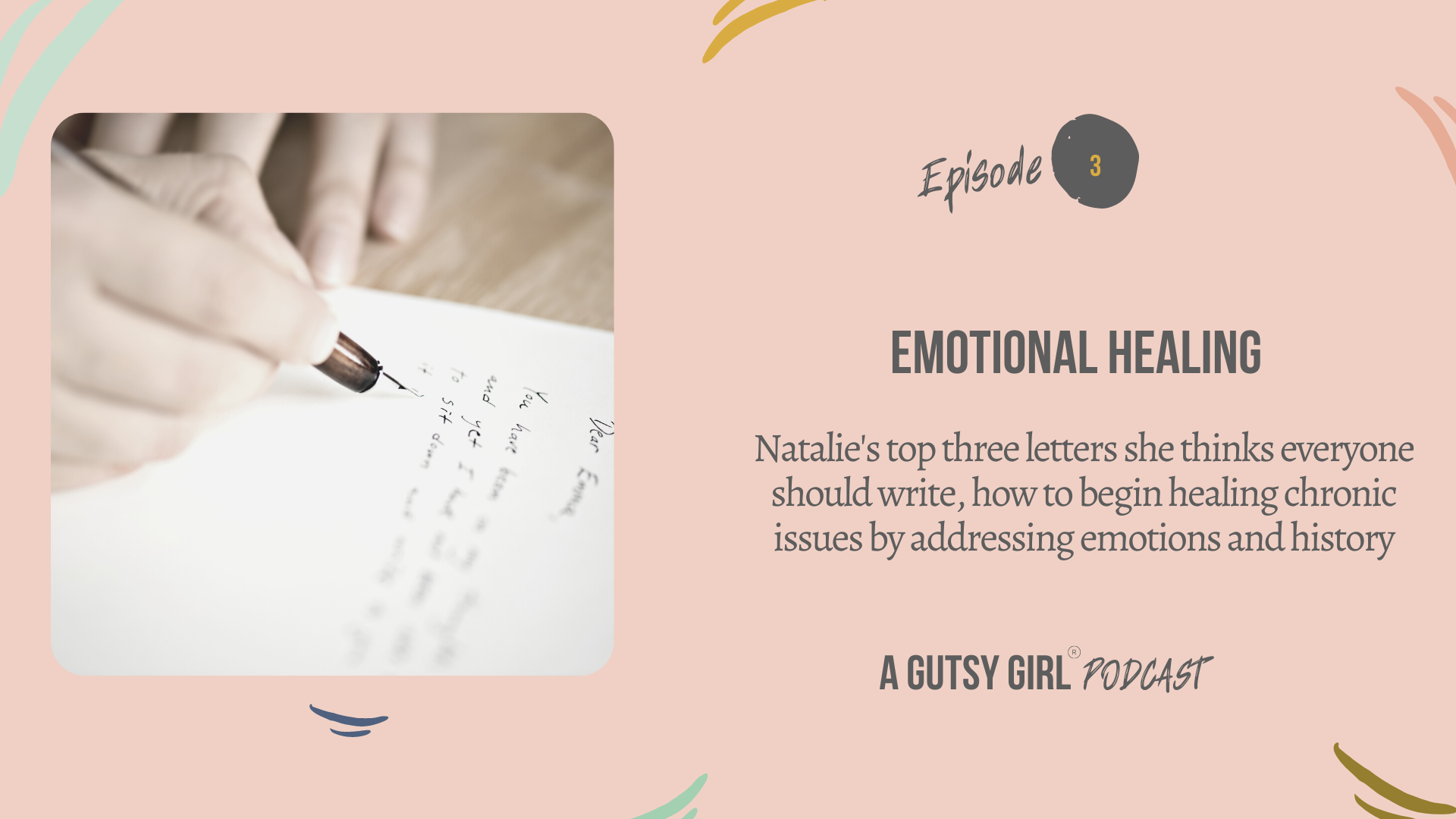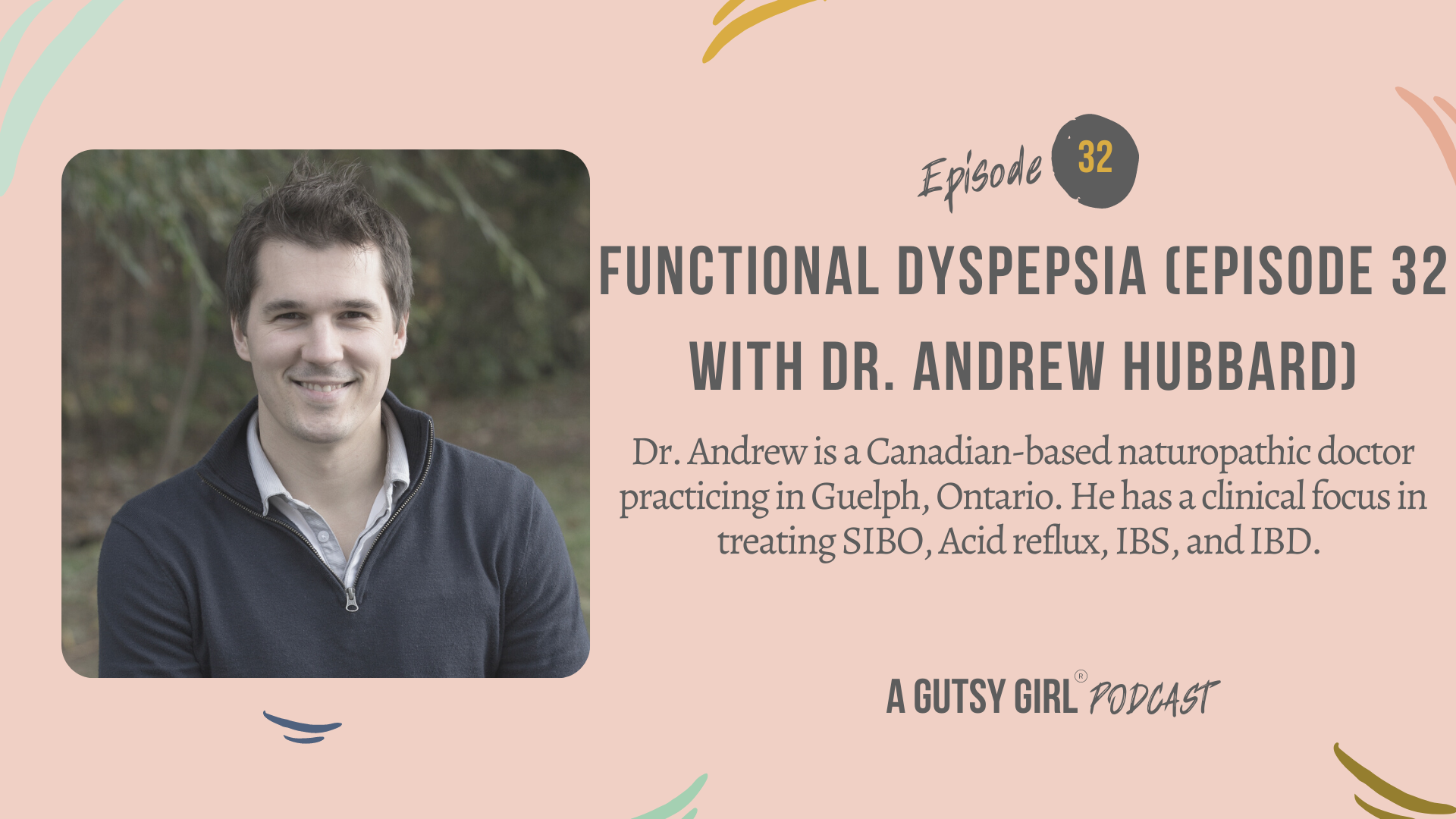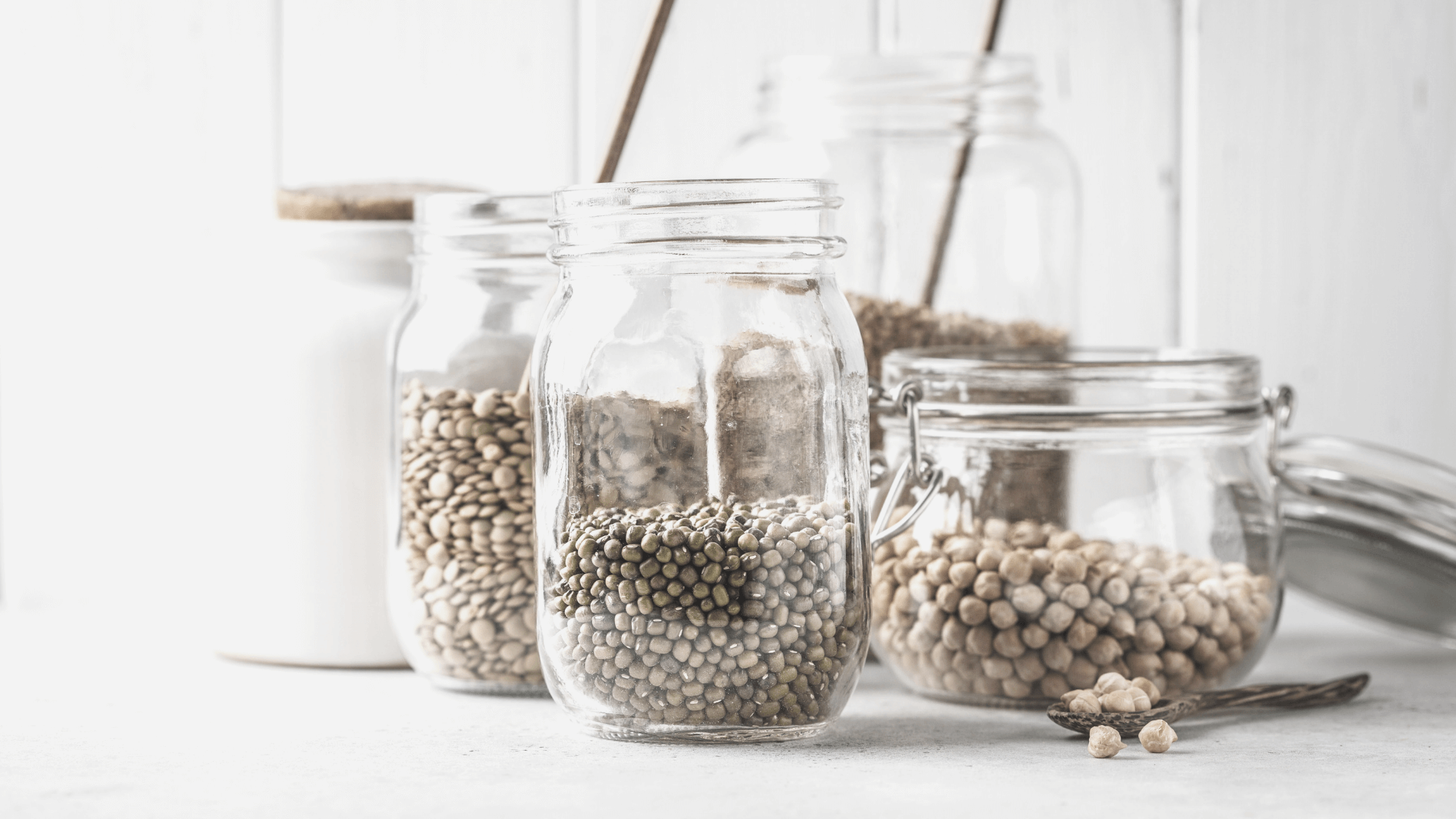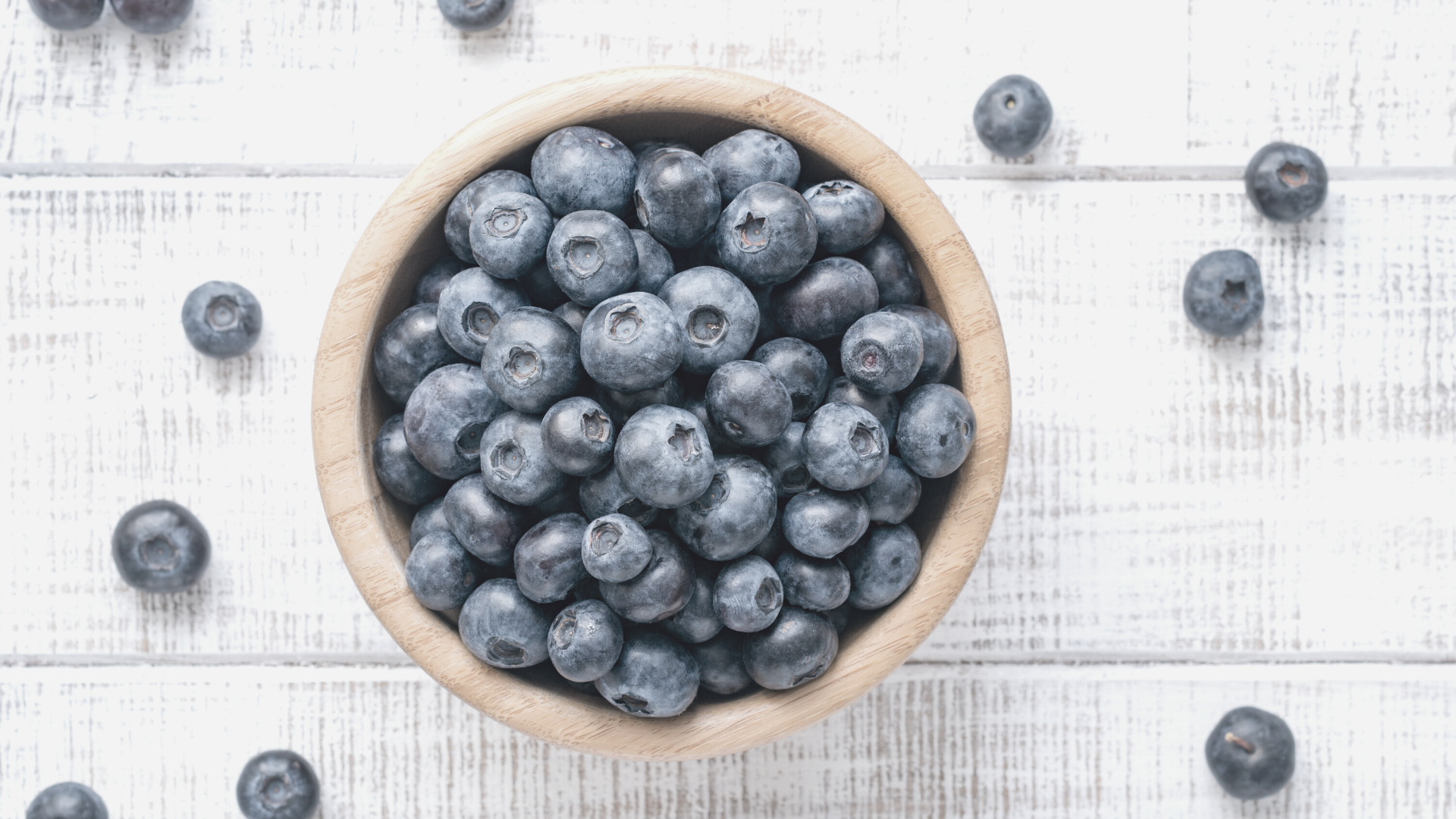What is the difference between zinc bisglycinate vs zinc gluconate? Learn all of this and more in today’s guide to zinc.
Zinc Bisglycinate vs Zinc Gluconate (A Guide to All Things Zinc)
Click HERE to save this post on Zinc Bisglycinate vs Zinc Gluconate for later.
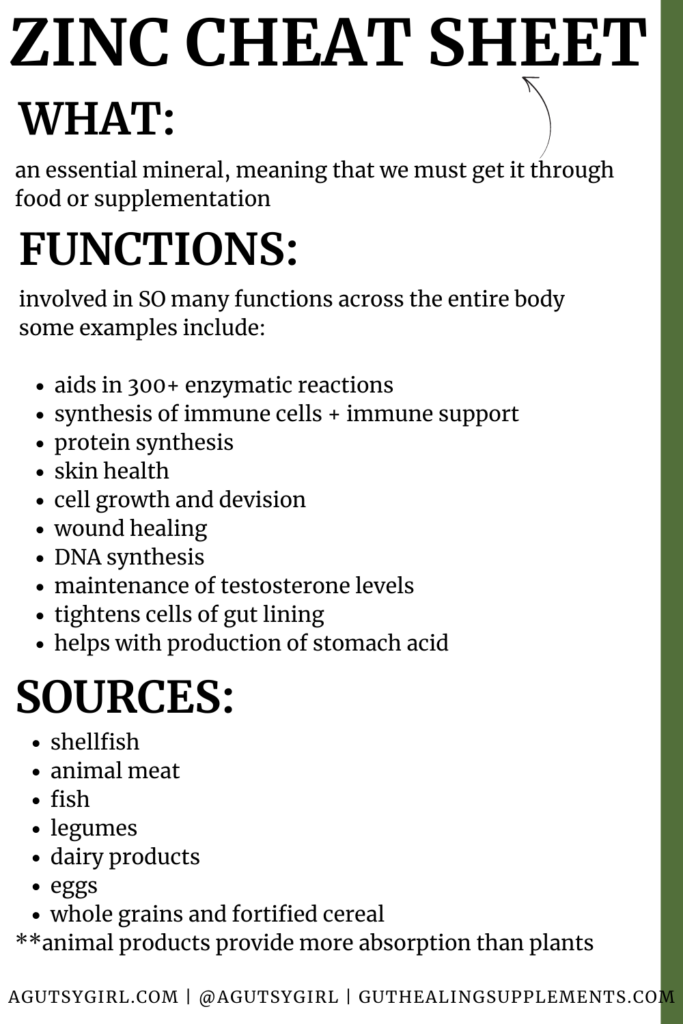
In the world of micronutrients, there are many vitamins and minerals that we take for granted. It is so incredibly easy to overlook the power of these compounds in the scope of our entire body.
One of these underrated minerals is zinc. Zinc supports many healing effects across the body and is critical for proper digestion.
Today we are going to dive into the world of zinc and understand more about the critical role it plays.
What is Zinc?
Zinc is known as an essential nutrient, meaning that the body can not produce it on its own. The zinc levels in our body are based purely on the zinc we consume through either food sources or dietary supplementation.
Zinc has SO many functions across the human body including:
- aids in over 300 enzymatic reactions
- synthesis of immune cells
- support of immune function
- protein synthesis
- support of skin health
- HUGE player in cell growth
- supports both smell and taste
- maintenance of testosterone levels
- wound healing
- DNA synthesis- provides blueprint for all functions in the body
As you can see, zinc has a wide range of physiological processes across the digestive, immune, and metabolic systems. It plays a crucial role in both the immune and digestive systems, which are important for keeping the gut in balance.
Source: HERE
How Much Zinc Do I Need?
The RDA (recommended dietary allowance) of zinc varies based on age and gender. It is advised that adult females should be eating about 8 mg of zinc each day while adult men should be eating 11 mg. This may seem like it should be easy to reach, but your food may not contain as much zinc as you believe.
Here is a list from the NIH of common zinc sources and their amount per serving.
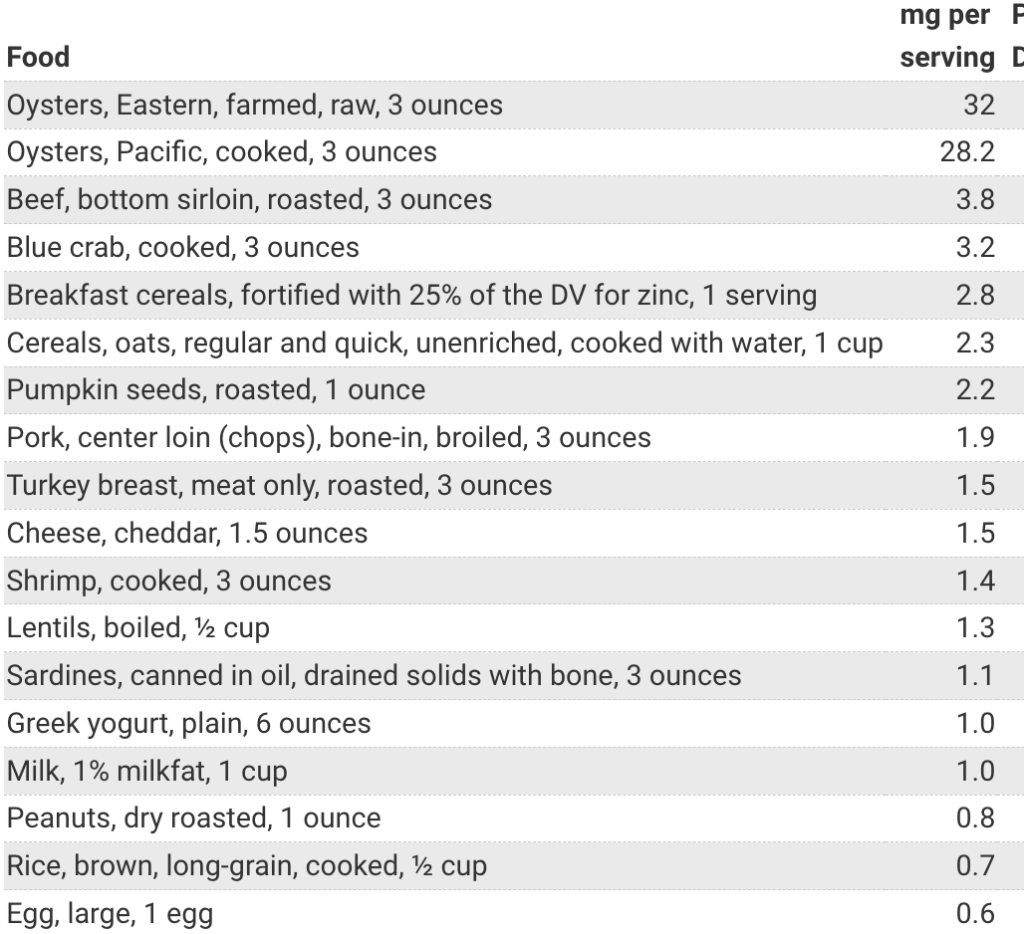
As you can see, many of these foods “high” in zinc actually contain an average of 2 grams per serving.
This means that you may not be getting the zinc daily dose needed purely from food sources.
Other common sources of zinc include:
- shellfish
- animal meat
- fish
- legumes
- nuts
- dairy products
- eggs
- whole grains
- fortified breakfast cereals
Keep in mind that animal products fulfill zinc needs more efficiently. Zinc coming from plant sources are absorbed less efficiently due to other interfering compounds in the plants.
To get high doses of zinc, I recommend choosing animal sources such as chicken, beef, and fish. These are also high in vitamin B12, another common deficiency in the Gutsy community.
If you are vegan or against consuming animal products, supplementation may be a strong option for you to consider.
Source: HERE
Zinc Deficiency
Even though I have talked about this in a previous blog post, I wanted to quickly skim over some of the warning signs of zinc deficiency.
While not extremely common among healthy adults, zinc deficiency is common among people with suppressed immune systems, GI issues, and those on a vegan or vegetarian diet. That’s right. Us Gutsy girls are at extremely high risk for this micronutrient deficiency.
Our zinc absorption is often impaired, which leads us highly deficient in this essential micronutrient.
Some red flags for deficiency include:
- diarrhea
- suppressed immune response- getting sick often
- loss of taste or smell
- dry skin
- trouble healing wounds
- issues with fertility
- loss of appetite
- impaired growth
While it is helpful to know some of these red flags, zinc deficiency manifests in many different health problems.
Since it affects SO many systems of the body, a deficiency will not look the same in every individual. It can affect everything from the digestive system to brain function, so a deficiency can often be hard to pinpoint.
It also manifests in different ways depending on age group, with some symptoms being more prevalent in childhood or adulthood.
That is why it is so so important to get your nutrient levels checked. Or, if you are really opposed, just trial run a low dose of zinc supplementation. Track how it makes you feel and go from there.
If you want to learn more about Zinc, check out THIS article already on my page.
Benefits of Zinc Supplementation
Since it can be hard to reach the recommended intake of zinc and you, in particular might be zinc deficient, some turn to zinc supplementation.
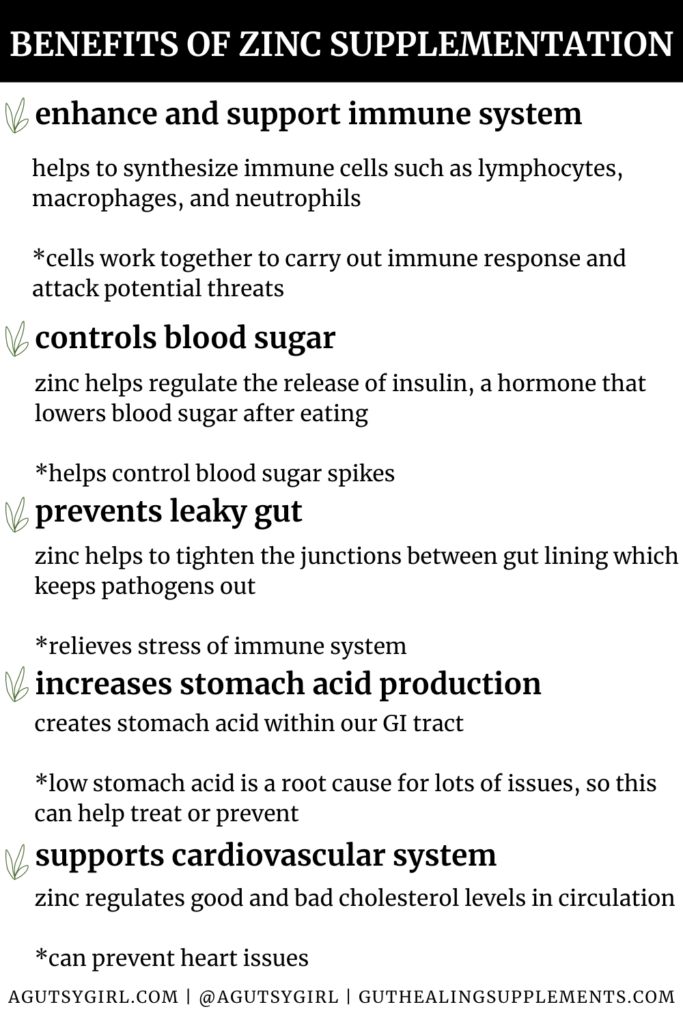
Some health benefits of zinc in supplement form:
Enhance and support immune system
Zinc helps to synthesize key players in the immune system including lymphocytes, macrophages, and neutrophils. These cells work together to both carry out immune responses as well as attack potential threats.
By taking a zinc supplement you can bump up the production of these cells and better support the functioning of your immune system as a whole. This is EXTREMELY important for anyone with Gutsy issues, as the immune system is often under constant stress.
Helps control blood sugar
Zinc is also involved in the release of insulin, a hormone created by the pancreas to lower blood sugar after eating. Stabilizing blood sugar levels helps prevent the development of diseases such as diabetes, or preventing post-meal crashes.
Supports cardiovascular system
Zinc helps with the regulation of good and bad cholesterol levels in circulation. This can help to prevent later issues such as heart disease or attacks.
Prevents leaky gut
One of my favorite things about zinc is its ability to “tighten” the junctions of the gut barrier. This prevents pathogens from entering the intestines and staying there.
For people with leaky gut, I always recommend finding a good zinc supplement to help repair the damaged gut lining. This helps relieve some of the stress on the immune system as well as support overall gut health.
Increases stomach acid production
Zinc also is used to create stomach acid within our GI tract. As many of you know by now, low stomach acid is one of the most common root issues of most Gutsy problems.
By increasing zinc consumption, you raise your body’s ability to produce its own stomach acid and break down foods more efficiently.
Which Zinc Supplement?
One of the issues that often comes with supplementing micronutrients is picking which one to use.
Dietary supplements can be difficult to navigate, especially when you do not fully understand the differences between molecules.
Some of the different types of zinc supplements include:
- zinc gluconate- fairly well absorbed and found in over-the-counter supplements and cold medicines
- zinc acetate- usually added to cold medications
- zinc sulfate- helps with both low zinc levels and targets acne
- zinc picolinate- one of the best absorbed forms of zinc
- zinc orotate- very widely available, bound to orotic acid, small molecules easily pass through gut membrane
- zinc citrate- appealing due to its slightly sweet taste, well absorbed by the gut
All of these molecules contain zinc, but they differ in which other element they are attached to. This changes the health benefits of each of these slightly and alters how they are absorbed in the gut.
If you know anything about chemistry, the chemical structure reflects the function of the compound. So different structures mean different functions. One little molecule can change the entire nature of the compound. How cool is that?
Absorption
Just so you have some tangible numbers here are the absorption rates of different forms of zinc. This proves how binding to different molecules can SIGNIFICANTLY impact how it interacts within the body.
Some common absorption values include:
- zinc oxide- 50% absorption
- zinc citrate- 61% absorption
- zinc gluconate- 61% absorption
In a clinical trial performed by supplement company Thorne, they found zinc bisglycinate to result in 43% higher zinc blood levels than zinc gluconate.
When compared when other forms of zinc such as zinc oxide and zinc picolinate, zinc bisglycinate was still found to have the highest value of absorption. This means that it was circulating in the blood at the highest concentration due to its passage through the intestinal wall.
In order the rate of absorption is zinc bisglycinate first, then zinc picolinate, zinc gluconate, and lastly zinc oxide.
This is a good factor to keep in mind when picking your preferred zinc supplement.
Since so many of us already struggle with absorption, this can be a good way to ensure you are meeting your recommended zinc levels.
Source: HERE
Zinc Gluconate
Zinc gluconate is one of the most widely available forms of zinc and is often found in over-the-counter supplements.
It is made by combining zinc molecules with gluconic acid, a naturally occurring organic molecule. This form of zinc is often used for zinc deficiency or for the treatment of colds. You will commonly find this in products such as cold lozenges or sprays, but be aware of the nasal sprays. Some cases of losing scent have been associated with these sprays.
This supplement is also often used for diarrhea, due to its high zinc content. Zinc has been known to better stabilize bowel movements, due to its effects on both the gut microbiome and its strengthening of the immune system.
Source: HERE
Zinc Bisglycinate
Zinc bisglycinate is a molecule formed by combining zinc with two of the amino acids glycine. This compound is known as a chelated molecule, or a molecule that attaches itself to organic compounds.
Chelated molecules are extremely helpful for those with Gutsy issues, as they have been found to increase absorption in the gut.
Chelating a mineral, such as zinc, provides a coating around it that prevents it from reacting with the external environment. This keeps it in its purest form when it reaches the gut and allows it to be better absorbed by the small intestine.
The chelate form of a molecule can be more expensive, but I find it to be well worth the extra money for the extra absorption benefits.
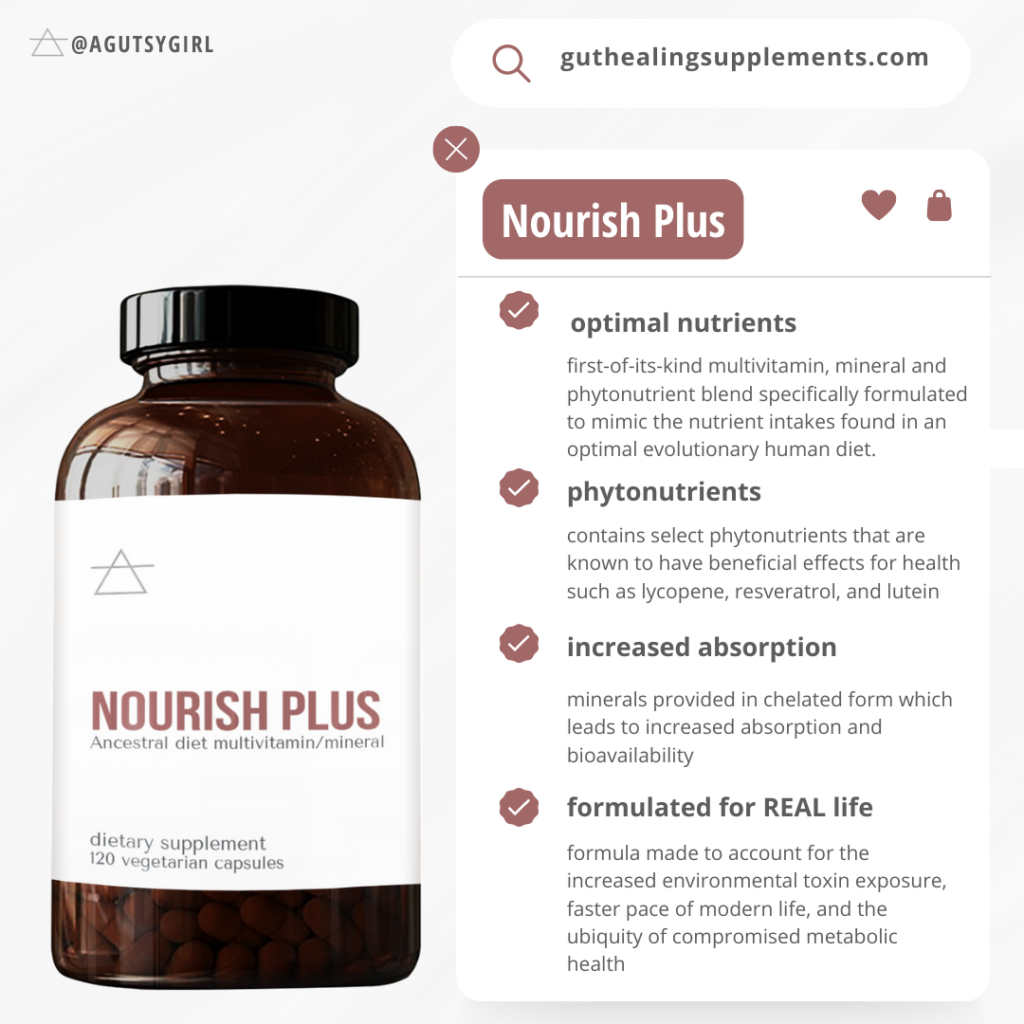
Nourish Plus contains 15mg zinc as a Chelated Zinc Bisglycinate. If a zinc deficiency is a concern, this is as optimal as you’ll find.
Use code AGUTSYGIRL at checkout to save 15%!
Chelation 101
I could go on and on about how beneficial chelated minerals are, but let’s just say they are PERFECT for Gutsy girls.
Some of the benefits of chelation include:
Easier transportation
Chelated minerals pass through the intestinal wall much easier than non-chelated minerals, which increases the absorption of the minerals. They are quickly transported into the bloodstream and sent to the liver for further processing.
This allows the body to optimize the mineral being consumed, as the majority of it will pass through the intestinal wall.
Neutral charge
Chelated minerals also have a neutral charge, which helps prevent them from reacting with other molecules within the gut. They mind their own business and do not attract or repel other molecules, making them extremely non-problematic.
Easy on the gut
One of my favorite parts of chelated micronutrients is their tendency to be much more gentle on the gut. Since they are fairly non-reactive and stable, they do not release or react before absorption.
This prevents uncomfortable GI symptoms, which we want to avoid.
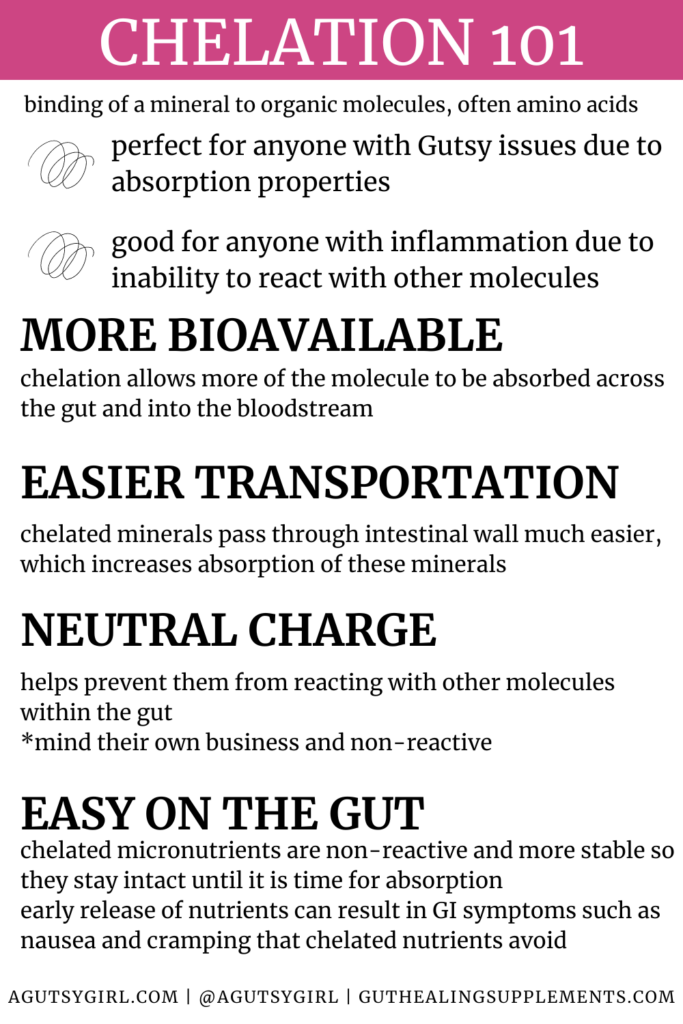
Zinc Gluconate vs. Zinc Bisglycinate
If we put these two zinc supplements head to head, there is no true winner. Each of them have specific benefits and cons, it totally depends on what your main priorities are.
To choose the best fit, try asking yourself these questions.
Am I on a tight budget?
If you are looking for something cheaper and more readily available, zinc gluconate is the choice for you. This supplement can be found at any pharmacy and most stores.
Am I concerned about zinc deficiency?
If you are truly concerned that you may have severe zinc deficiency then opt for the zinc bisglycinate. This is more easily absorbed by your gut and will raise your zinc levels at a faster rate.
Do I already have severe GI issues?
If you are someone who already has severe GI symptoms such as abdominal pain, nausea, and bloating, then opt for the zinc bisglycinate. This supplement, due to its chelation, is much less likely to cause GI side effects.
My Personal Opinion
In my opinion I truly feel as though zinc bisglycinate is the Gutsy way to go.
This is why we put the zinc type (Chelated Zinc Bisglycinate) in Nourish Plus; it makes a much better choice for those with absorption issues.
Here are some of my favorite zinc bisglycinate products:
- Nourish Plus (use code AGUTSYGIRL at checkout to save 15%)
- Thorne’s Zinc Bisglycinate
- Integrative Therapeutics Zinc Chelate
All of these are from brands that pride themselves on making good, clean products, which is exactly what we are looking for.
They also contain the best form of zinc in my opinion, zinc bisglycinate.
I hope you have a bit more guidance on your zinc supplements and can pick one that best fits your needs.
Comment down below if you take a zinc supplement, and what type of positive benefits you’ve noticed by taking one.
If you liked this post on Zinc Bisglycinate vs Zinc Gluconate, you might also enjoy:
- Vitamin C for Gut Health
- Betaine HCL (vs. Digestive Enzymes)
- Complete List of Common Digestive Conditions
Xox,
SKH
Janie Greene is

